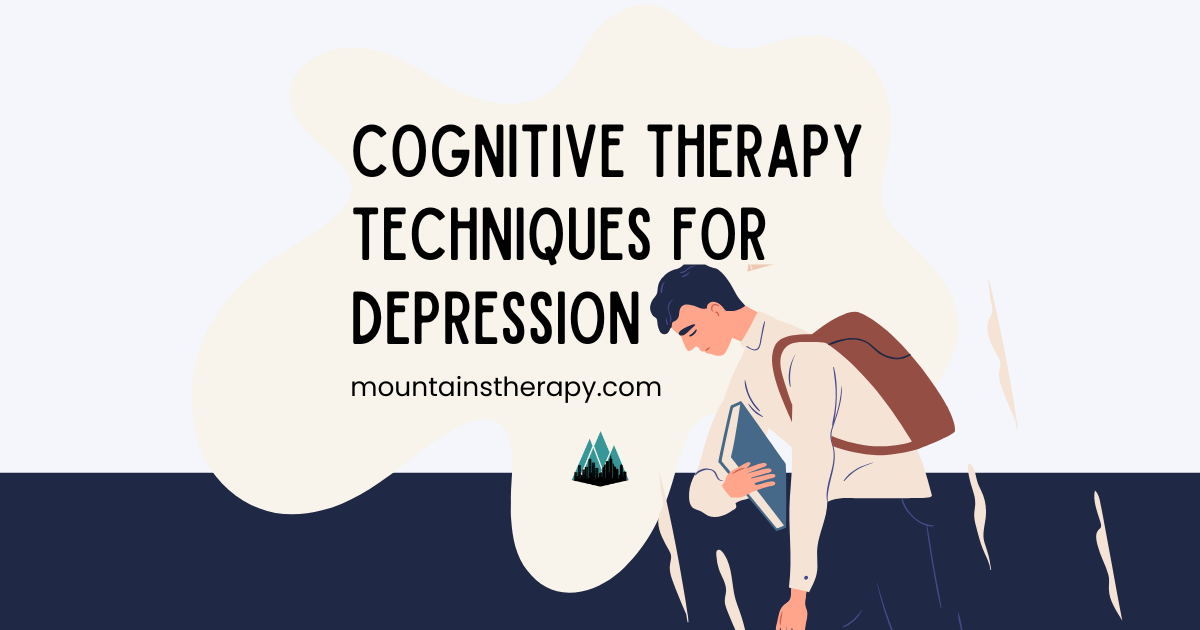Cognitive Therapy Techniques for Depression: How to Make Positive Change
Learn more about Depression Therapy and CBT Therapy.
In This Blog, You’ll Learn:
- What Cognitive Behavioral Therapy (CBT) is and how it can help with depression
- Symptoms of depression and their impact on daily life
- How CBT techniques can address specific symptoms of depression
Understanding Cognitive Behavioral Therapy (CBT): What is CBT for Depression?
Cognitive Behavioral Therapy is a proven, effective approach to addressing depression. It works by helping you identify negative thought patterns and replace them with healthier ones. Many people searching for the Best depression therapist or the Best depression therapy find that CBT offers both practical tools and emotional relief.
CBT is especially effective for tackling depression because it equips you with skills to manage tough situations while fostering positive change. If you’re looking for the Best depression counselor or Best depression counseling, Montclair, NJ, is home to skilled professionals who can help you take meaningful steps toward recovery.
Frequently Asked Questions About CBT for Depression
- What is CBT depression?
- CBT for depression focuses on addressing negative thought patterns and behaviors that contribute to depressive symptoms.
- Can CBT cure depression?
- CBT is highly effective at reducing symptoms of depression, but it is not considered a "cure." Instead, it provides long-term tools to manage and prevent symptoms.
- Can CBT make depression worse?
- Initially, addressing painful emotions in therapy might feel uncomfortable, but over time, CBT helps you process and manage these emotions effectively.
- Can CBT be used for depression?
- Absolutely. CBT is one of the most widely recommended therapies for depression, addressing both cognitive and behavioral aspects of the condition.
- How does CBT help depression?
- CBT helps by teaching you to identify and challenge unhelpful thoughts, develop healthier behaviors, and create routines that support emotional well-being.
- What does CBT for depression involve?
- CBT involves techniques like cognitive restructuring, journaling, behavioral activation, and mindfulness exercises tailored to address depressive symptoms.
- Why CBT for depression?
- CBT is evidence-based, practical, and focuses on empowering individuals to take control of their mental health.
Symptoms of Depression and How CBT Can Help
Depression can affect people differently, but common symptoms include the following. CBT techniques can directly target these symptoms, offering tools to alleviate their intensity and help you manage daily life more effectively.
- Persistent sadness or low mood
- Difficulty concentrating or making decisions
- Loss of interest or pleasure in activities
- Feelings of worthlessness or excessive guilt
- Fatigue or low energy levels
- Changes in appetite (eating too much or too little)
- Sleep disturbances (insomnia or oversleeping)
- Physical symptoms (aches, pains, or gastrointestinal issues)
- Irritability or anger
- Social withdrawal or isolation
- Feelings of hopelessness or helplessness
- Reckless behavior or difficulty managing impulses
- Thoughts of self-harm or suicide
Cognitive Therapy Techniques to Help with Depression
1. Cognitive Restructuring
- Symptoms It Helps: Persistent sadness, feelings of worthlessness, hopelessness
- Example: Challenge automatic negative thoughts like "I’m a failure" with evidence-based thinking: "I’ve faced challenges and succeeded before."
- Why It Helps: By reframing negative thoughts, you can break the cycle of self-criticism and begin to view yourself and your circumstances more positively.
2. Behavioral Activation
- Symptoms It Helps: Fatigue, loss of interest in activities, social withdrawal
- Example: Schedule a small enjoyable activity, like meeting a friend or taking a walk, to break the cycle of inactivity.
- Why It Helps: Engaging in positive activities can lift your mood, increase energy, and reconnect you with the things that bring joy.
3. Thought Journaling
- Symptoms It Helps: Difficulty concentrating, excessive guilt, irritability
- Technique: Write down your thoughts and feelings to identify patterns and evaluate their accuracy.
- Why It Helps: Journaling helps you process emotions, organize your thoughts, and approach problems with clarity.
4. Problem-Solving Skills
- Symptoms It Helps: Overwhelm, irritability, reckless behavior
- Approach: Break down challenges into smaller, manageable steps and create actionable plans.
- Why It Helps: This technique reduces feelings of helplessness and builds confidence as you take control of your problems.
5. Mindfulness and Relaxation Techniques
- Symptoms It Helps: Anxiety, restlessness, sleep disturbances, physical symptoms
- Methods: Practice mindfulness exercises like deep breathing, progressive muscle relaxation, or meditation.
- Why It Helps: Staying present can reduce stress, prevent rumination, and improve emotional regulation, making it easier to manage physical and emotional symptoms.
Why Choose Mountains Therapy NJ? Mountains Therapy was Awarded the Best of Montclair 2024
If you’re looking for the Best cognitive behavioral therapy therapist near me or the Best CBT counselor near me, Mountains Therapy NJ is here to help. Our team specializes in personalized care to address depression with Cognitive Behavioral Therapy. As the Best Therapist of Montclair 2024, we’re committed to offering compassionate, effective support tailored to your needs. Whether you’re feeling stuck, overwhelmed, or unsure of where to start, we’ll work with you to develop a plan that empowers you to regain control of your life.











